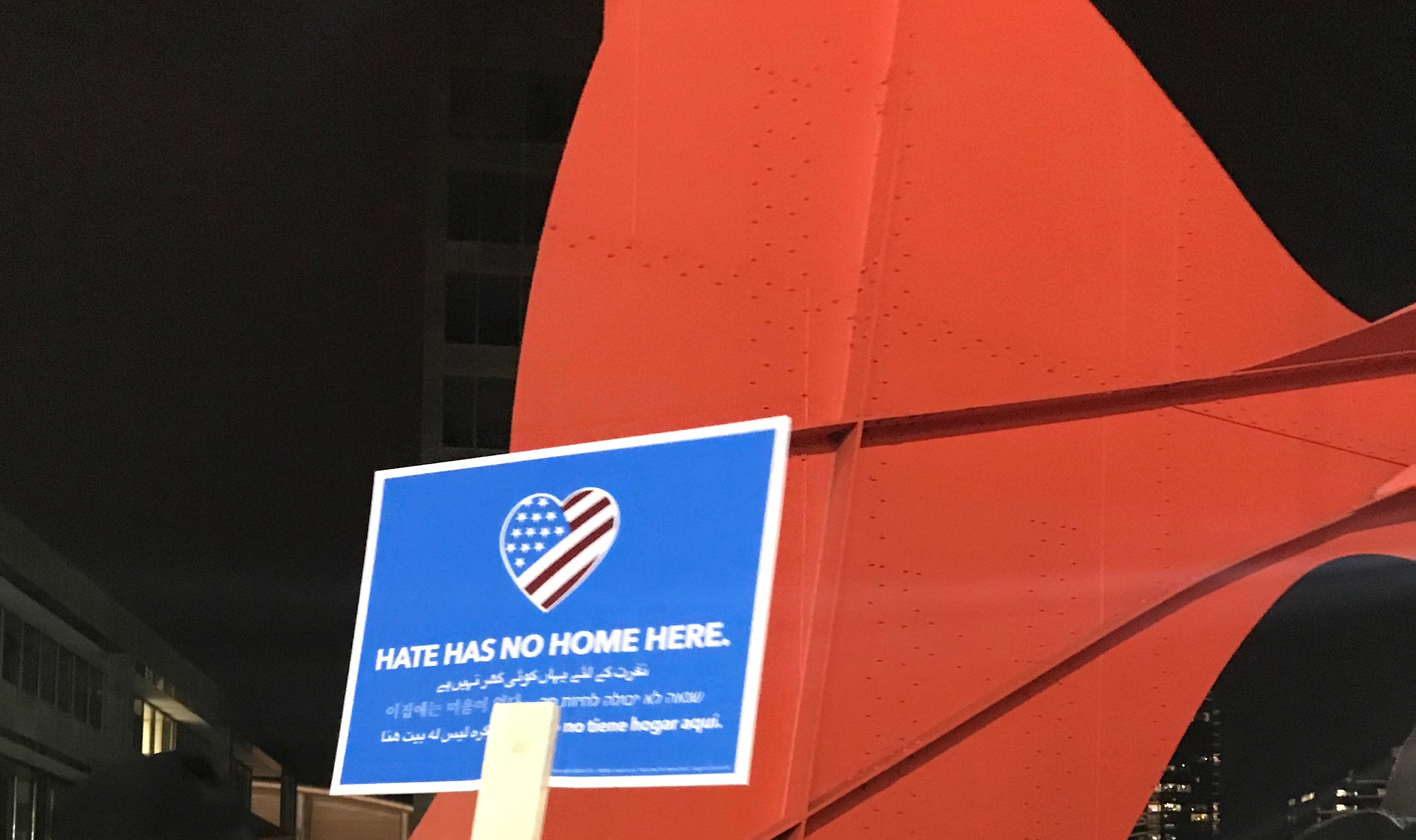
“He hoped to kill our spirit, but he strengthened it.”The cantor of Temple Emanuel lead the crowd in a song of Psalm 133 (CJB). Read the words while you listen to the song:
Oh, how good, how pleasant it is for brothers to live together in harmony.
It is like fragrant oil on the head that runs down over the beard, over the beard of Aharon, and flows down on the collar of his robes.
It is like the dew of Hermon that settles on the mountains of Tziyon. For it was there that Adonai ordained the blessing of everlasting life.
Fear of something is at the root of hate for others, and hate within will eventually destroy the hater.Jones also spoke about forgiveness being integral to the ability to love, which is true, but the women around me were not ready to hear that. I’ve certainly had seasons when I was not ready to talk forgiveness, when I had to ask God to make me even want to want to forgive. But how do you forgive a man who hates your people enough to murder them in their place of worship? To scream his hatred of Jews while being cared for by Jewish medical professionals? How do you forgive a murderer when you know that there are others out there like him, and because of that, you have to have armed guards at your synagogue? It feels like forgiving the ideology and culture that spawned those beliefs and that hatred. Imam Morsy Salem of PLACE spoke next. It was such an interesting experience to listen to him unpack the story of Cain and Abel, aka Qābīl and Hābīl, but his message was clear: do not hate each other, do not kill each other. Rabbi Yosef Weingarten of Chabad House said about prayer that it isn’t merely an opportunity to ask for what you need:
Prayer provides us with the opportunity to align our body and our soul with the…God above. In these moments of unspeakable pain, as we search for answers, we take refuge in our traditions–[in our Jewish tradition, mourning is not just about pain], but hope and conviction.”He encouraged all of us to add just one small act of kindness in our daily lives to build each other up. In honor of the members and police officers who were injured in the shooting at Tree of Life, Rabbi Weingarten and Chief Rahinsky read Psalm 121 (CJB) as a prayer, the Rabbi in Hebrew and the Chief in English:
Following him were Father Robert Sirico of the Acton Institute and Rev. Colleen Squires of All Souls Community Church. Rev. Squires is a regular attender at Grand Rapids Association of Pastor meetings, so I know her a little bit. I was moved by the emotion in her voice as she talked about the hospitality of Congregation Ahavas Israel, which has given All Souls the space to worship for the last 13 years, and how it was both right and weighty to walk into their mutual building for services the day after the shooting. Then came Teresa Thome of Self-Realization Fellowship (representing the Hindu faith) and Dr. Doug Kinshi of GVSU’s Kaufman Interfaith Center. Rabbi David Krishev of Congregation Ahavas put it in stark words:If I raise my eyes to the hills, from where will my help come? My help comes from Adonai, the maker of heaven and earth. He will not let your foot slip — your guardian is not asleep. No, the guardian of Isra’el never slumbers or sleeps.
Adonai is your guardian; at your right hand Adonai provides you with shade — the sun can’t strike you during the day or even the moon at night.
Adonai will guard you against all harm; he will guard your life. Adonai will guard your coming and going from now on and forever.
The question, ‘Am I willing to give up my life for my faith,’ is a question we don’t want to hear, and don’t want to answer. It is a question we thought we’d left behind.He went on to list the people of various faiths who are being killed due to their beliefs. His desire was simple: “We, as people who believe in the power of religious community, want to continue to gather at our places of worship openly…and safely.” Rabbi Schadick closed the event with a song from the end of the mourner’s Kaddish, lead by a soloist from Temple Emanuel:
He who creates peace in His celestial heights, may He create peace for us and for all Israel; and say, Amen.It was a wonderful event, full of talk of love and respect and standing together against hate. I loved the use of Adonai instead of “the Lord” in the passages read; if felt so intimate. My favorite part was the singing–listening to those ancient words being sung all around me, all known by heart, was powerful. Those words have been said and sung in that form for many thousands of years. Those words and those messages have survived. They’ve survived many attempts to eradicate them and those who speak them, and they’ll survive this one, too. I’ll add a few more from Psalm 95:7-8 (NLT) as my prayer for my fellow Christians who are consumed with fear and hate:
If only you would listen to his voice today! The Lord says, “Don’t harden your hearts…”